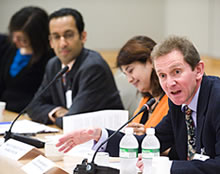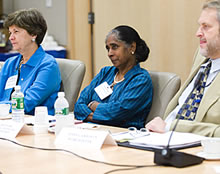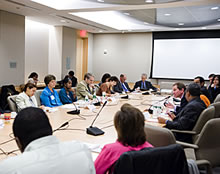The IMF and Civil Society

Professor Jan Aart Scholte speaking to the audience at IMF headquarters in Washington DC. In the background, Professor Alnoor Ebrahim and moderator Preeti Shroff-Mehta from the World Bank.
Filling accountability gaps through civil society engagement
November 18, 2008
At a recent seminar hosted by the IMF and the World Bank, a prominent academic and his team made a presentation on the role of civil society in furthering the accountability of international financial institutions.
Professor Jan Aart Scholte from the University of Warwick and the London School of Economics and his team of researchers presented the findings and recommendations of the Civil Society and Accountable Global Governance project, which has examined in what ways and to what extent civil society organizations (CSOs) have made international organizations such as the the IMF and the World Bank accountable to the general public. The project involved a study of 13 international organizations. The book that assembles these studies will be published next year.
Professor Scholte , who has studied IMF-civil society relations for over ten years and also helped the Fund prepare the Guide for Staff Relations with Civil Society Organizations (CSOs), presented the findings related to the IMF. Scholte argued that various types of CSOs have used multiple kinds of tactics to advance IMF accountability, especially in relation to transparency, consultation and evaluation, although fewer impacts have been had in respect of "redress" (e.g. in the form of apologies, reparations, resignations, and institutional reorganization). The overall scale of these contributions, he added, have remained modest and civil society has only partially closed the "significant accountability gap" at the Fund.

Carolyn Long and Dr. Nata Duvuury from the International Center for Research on Women and John Garrison, Senior Civil Society Specialist at the World Bank.
Scholte said that civil society relations at the IMF have often focused on outreach to CSOs in the global north and what he terms as "narrow elite circles in the academia, business, and better-resourced NGOs" rather than to CSOs from low-income countries and marginalized social groups who generally experience the greatest accountability deficits vis-à-vis the Fund. According to Scholte, the need for future improvements in IMF accountability is therefore not only to nurture more civil society activities, but also more civil society initiatives that directly engage, and are themselves more accountable to, marginalized countries and social groups.
In his presentation, Professor Alnoor Ebrahim from the Harvard Business School described the experiences of civil society interactions with the World Bank. He argued that CSOs have been influential in advancing Bank accountability at the project and policy levels, particularly through the establishment and enforcement of social and environmental safeguards as well as complaint and response mechanisms. However, civil society interventions have been much less successful in changing staff incentives for accountability, or in improving board accountability through greater transparency in decision making, more representative vote allocation, or better parliamentary scrutiny.

Many CSO representatives participated in the discussion of this very important topic.
Vasuki Shastry, Chief of Public Affairs at the IMF, kicked off the discussion by welcoming Scholte's work on the Fund. On the topic of transparency, he pointed to the increasing effort to publish materials in languages other than English. He said that the IMF recognizes that it should do more to actively consult with civil society before implementing major policy recommendations. That is why IMF Managing Director Dominique Strauss-Kahn has enunciated the principle of CSOs comprising the "fourth pillar" in the Fund's efforts to introduce a second round of governance reforms. He added that the IMF is committed to extending its engagement with Southern CSOs and parliamentarians but pointed out that resources for expansion of outreach are going to be a real constraint. The Fund has therefore focused on a few key areas where it hopes to see measurable progress. This includes more effectively using the IMF's network of resident representatives, conducting more in-country outreach in the context of IMF staff missions, and collaborating with the Bank in sponsoring groups of Southern CSOs (and journalists) to attend the Annual Meetings.
Dr. Nata Duvvury and Carolyn Long also presented their findings of studies undertaken at the International Center for Research on Women concerning the Global Fund to Fight HIV/AIDS, Tuberculosis and Malaria.
